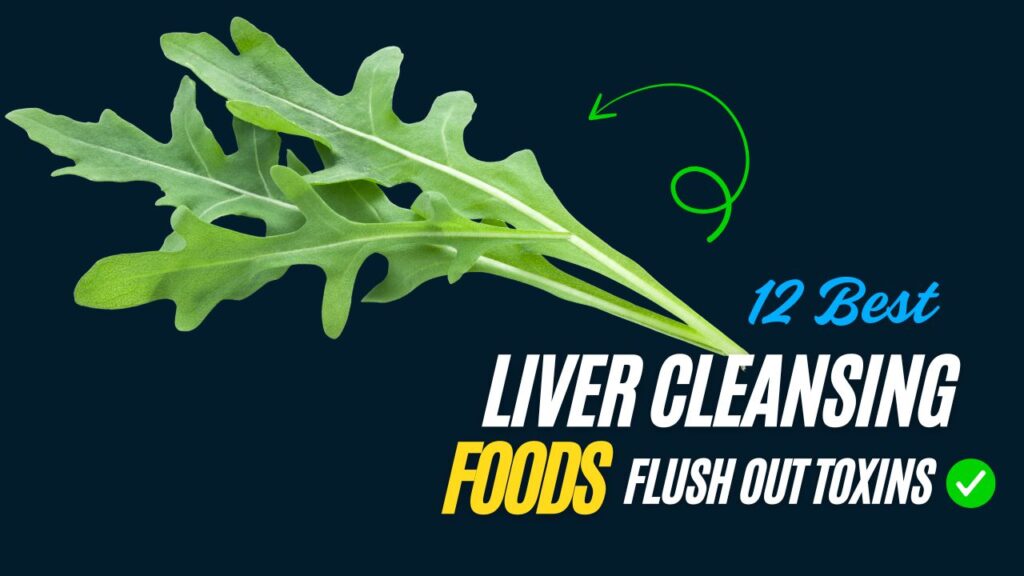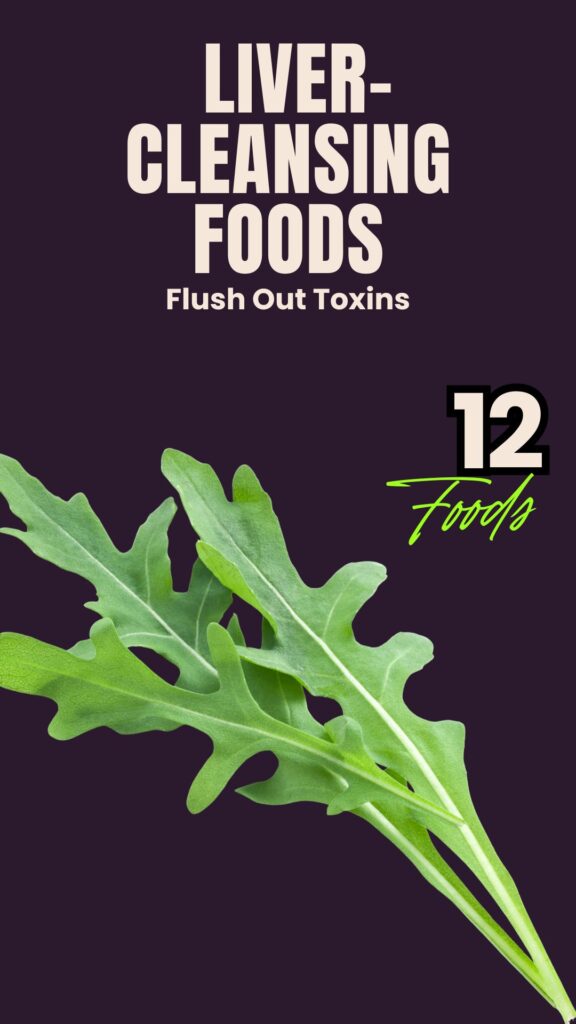Did you know that your liver performs over 500 essential functions every single day—from filtering toxins and metabolizing nutrients to supporting digestion and hormone balance?
Yet, despite working tirelessly, the liver often goes unnoticed until it starts showing signs of fatigue, such as low energy, skin issues, or sluggish digestion.
Struggling with fatigue, brain fog, or stubborn belly fat? It might not be just your lifestyle—it could be your liver asking for some extra care. The good news is, certain foods have natural cleansing properties that can help the liver regenerate, flush out toxins, and function at its peak.
In this post, you’ll discover:
- 12 powerful foods that support liver health.
- The best ways to eat them for maximum benefit.
- Who should eat them regularly (and who should be cautious).
- Smart storage and buying tips to keep nutrients intact.
- Common do’s and don’ts for each food.
Let’s dive into the ultimate list of liver-friendly foods you can start adding to your meals today.

Table of Contents

12 Best Liver-Cleansing Foods To Eat
1. Garlic
Garlic is rich in sulfur compounds that activate liver enzymes, helping your body flush out toxins more efficiently. It also contains allicin and selenium—two nutrients proven to protect the liver from damage.
Best Ways to Eat or Use It
- Add raw garlic to salad dressings or dips.
- Lightly sauté in olive oil for soups and stir-fries.
- Use roasted garlic for a milder flavor.
Who Should Eat / Avoid
- Good for: people with high cholesterol, those looking to boost immunity.
- Avoid/Limit if: you suffer from acid reflux or have garlic allergies.
Storage & Buying Tips
- Choose firm, unbruised bulbs with tight skin.
- Store in a cool, dark place for up to 3 months.
Do’s & Don’ts
| ✅ Do | ❌ Don’t |
|---|---|
| Crush garlic and let it sit for 10 minutes before cooking (activates allicin). | Don’t store peeled cloves at room temperature—it can lead to mold. |
Possible Side Effects
- Overconsumption may cause stomach upset or strong breath odor.
2. Beets
Beets contain betaine, which helps the liver process fats and reduces oxidative stress. Their deep red pigment signals high antioxidants that protect liver cells.
Best Ways to Eat or Use It
- Roast beets for salads.
- Blend into smoothies with carrots and apples.
- Use beet juice as a detox drink.
Who Should Eat / Avoid
- Good for: athletes (boosts stamina), those managing blood pressure.
- Avoid/Limit if: you have kidney stones (high oxalates).
Storage & Buying Tips
- Select small to medium beets with firm roots.
- Store in the fridge with greens removed to extend freshness.
Do’s & Don’ts
| ✅ Do | ❌ Don’t |
|---|---|
| Cook beets with skin on, then peel for maximum nutrients. | Don’t toss beet greens—they’re highly nutritious. |
Possible Side Effects
- May cause “beeturia” (red-colored urine), which is harmless.
3. Leafy Greens (Spinach, Kale, Arugula)
Leafy greens are loaded with chlorophyll, which helps neutralize heavy metals and environmental toxins that burden the liver.
Best Ways to Eat or Use It
- Add raw spinach to smoothies.
- Sauté kale with garlic and olive oil.
- Toss arugula into salads.
Who Should Eat / Avoid
- Good for: weight-loss seekers, people with high cholesterol.
- Avoid/Limit if: you’re on blood thinners (due to high vitamin K).
Storage & Buying Tips
- Choose crisp, vibrant leaves.
- Wrap in a paper towel and store in an airtight bag in the fridge.
Do’s & Don’ts
| ✅ Do | ❌ Don’t |
|---|---|
| Wash thoroughly before use. | Don’t leave washed greens wet—they wilt faster. |
Possible Side Effects
- Excessive intake can cause kidney stones in sensitive individuals.
4. Green Tea
Green tea is packed with catechins, antioxidants that improve liver enzyme levels and reduce fat buildup.
Best Ways to Eat or Use It
- Drink freshly brewed green tea (not bottled).
- Add lemon juice to enhance absorption of antioxidants.
Who Should Eat / Avoid
- Good for: those managing weight, people with fatty liver.
- Avoid/Limit if: you’re sensitive to caffeine or pregnant.
Storage & Buying Tips
- Buy loose-leaf tea for higher quality.
- Store in airtight containers away from light.
Do’s & Don’ts
| ✅ Do | ❌ Don’t |
|---|---|
| Brew for 2–3 minutes to retain antioxidants. | Don’t over-steep—it turns bitter. |
Possible Side Effects
- Excess consumption may cause insomnia or stomach upset.
5. Turmeric
Turmeric’s active compound, curcumin, reduces inflammation and promotes regeneration of liver cells.
Best Ways to Eat or Use It
- Add to curries, soups, and rice dishes.
- Drink turmeric milk before bed.
- Pair with black pepper for better absorption.
Who Should Eat / Avoid
- Good for: people with arthritis, those with fatty liver.
- Avoid/Limit if: you’re on blood-thinning medications.
Storage & Buying Tips
- Buy organic turmeric powder.
- Store in an airtight jar away from sunlight.
Do’s & Don’ts
| ✅ Do | ❌ Don’t |
|---|---|
| Mix with black pepper to enhance curcumin absorption. | Don’t rely on turmeric supplements without consulting a doctor. |
Possible Side Effects
- Overuse may cause nausea or lower blood sugar levels.
6. Grapefruit
Grapefruit is rich in antioxidants like naringenin and naringin, which reduce inflammation and protect liver cells.
Best Ways to Eat or Use It
- Eat fresh grapefruit segments.
- Blend into detox juices.
Who Should Eat / Avoid
- Good for: weight management, boosting immunity.
- Avoid/Limit if: you’re taking certain medications (it can interfere).
Storage & Buying Tips
- Select firm, heavy grapefruits with smooth skin.
- Store at room temperature or refrigerate.
Do’s & Don’ts
| ✅ Do | ❌ Don’t |
|---|---|
| Eat fresh to maximize vitamin C. | Don’t mix with prescription meds without checking with a doctor. |
Possible Side Effects
- May interact with medications like statins or blood pressure drugs.
7. Avocados
Avocados are high in glutathione, a powerful antioxidant that supports detoxification.
Best Ways to Eat or Use It
- Add slices to sandwiches or salads.
- Mash into guacamole.
- Blend into smoothies.
Who Should Eat / Avoid
- Good for: heart health, people with high cholesterol.
- Avoid/Limit if: you’re allergic or on a calorie-restricted diet (due to high fat).
Storage & Buying Tips
- Choose slightly soft avocados.
- Store unripe ones at room temperature until they soften.
Do’s & Don’ts
| ✅ Do | ❌ Don’t |
|---|---|
| Sprinkle lemon juice on cut avocados to prevent browning. | Don’t refrigerate unripe avocados. |
Possible Side Effects
- Excessive intake can add too many calories.
8. Walnuts
Walnuts are rich in omega-3 fatty acids and arginine, which support liver detox pathways.
Best Ways to Eat or Use It
- Snack on a handful of raw walnuts.
- Add to oatmeal or salads.
- Blend into walnut butter.
Who Should Eat / Avoid
- Good for: brain health, heart health, vegetarians.
- Avoid/Limit if: you’re allergic to nuts.
Storage & Buying Tips
- Store in the fridge to prevent rancidity.
- Buy unsalted, raw walnuts for maximum benefit.
Do’s & Don’ts
| ✅ Do | ❌ Don’t |
|---|---|
| Eat a small handful daily. | Don’t overeat—they’re calorie-dense. |
Possible Side Effects
- Overconsumption can cause digestive upset.
9. Apples
Apples are high in pectin, which binds toxins in the digestive tract and eases the liver’s workload.
Best Ways to Eat or Use It
- Eat fresh with the skin.
- Add slices to salads or oatmeal.
- Blend into smoothies.
Who Should Eat / Avoid
- Good for: digestive health, weight management.
- Avoid/Limit if: you’re fructose intolerant.
Storage & Buying Tips
- Choose firm apples with smooth skin.
- Refrigerate to extend freshness.
Do’s & Don’ts
| ✅ Do | ❌ Don’t |
|---|---|
| Eat with skin for fiber. | Don’t peel unless necessary—most nutrients are in the skin. |
Possible Side Effects
- Too many apples may cause bloating in sensitive individuals.
10. Lemons
Lemons stimulate bile production, which aids digestion and liver detox.
Best Ways to Eat or Use It
- Drink warm lemon water in the morning.
- Add lemon juice to salads or seafood.
Who Should Eat / Avoid
- Good for: digestion, immune support.
- Avoid/Limit if: you have acid reflux or sensitive teeth.
Storage & Buying Tips
- Choose heavy lemons with thin skin.
- Store in the fridge for up to 3 weeks.
Do’s & Don’ts
| ✅ Do | ❌ Don’t |
|---|---|
| Use fresh lemon juice. | Don’t rely on bottled lemon juice—it loses nutrients. |
Possible Side Effects
- Excess may erode tooth enamel.
11. Olive Oil
High-quality olive oil supports liver function by lowering oxidative stress and improving bile flow.
Best Ways to Eat or Use It
- Drizzle on salads.
- Use as a dip with whole-grain bread.
Who Should Eat / Avoid
- Good for: heart health, anti-inflammatory diet.
- Avoid/Limit if: you’re on a very low-fat diet.
Storage & Buying Tips
- Buy extra virgin olive oil in dark glass bottles.
- Store away from heat and light.
Do’s & Don’ts
| ✅ Do | ❌ Don’t |
|---|---|
| Use raw for best benefits. | Don’t overheat—it loses nutrients. |
Possible Side Effects
- High amounts may cause loose stools.
12. Broccoli
Broccoli contains glucosinolates, which activate liver detox enzymes and protect against cancer-causing compounds.
Best Ways to Eat or Use It
- Steam lightly to retain nutrients.
- Add to stir-fries or soups.
- Eat raw with hummus.
Who Should Eat / Avoid
- Good for: cancer prevention, overall detox.
- Avoid/Limit if: you have thyroid issues (in large amounts).
Storage & Buying Tips
- Choose bright green florets.
- Store in the fridge and consume within 4–5 days.
Do’s & Don’ts
| ✅ Do | ❌ Don’t |
|---|---|
| Steam instead of boiling to preserve nutrients. | Don’t overcook—it destroys antioxidants. |
Possible Side Effects
- Excess may cause gas or bloating.
Conclusion
Your liver is your body’s natural detox powerhouse, but it needs the right fuel to work efficiently. From garlic and beets to broccoli and lemons, these 12 foods provide the nutrients and antioxidants that keep your liver strong, clean, and energized.
Start small—maybe add lemon water in the morning, a spinach salad at lunch, and roasted beets at dinner. Over time, these small changes add up to powerful improvements in your liver health.
Which of these liver-cleansing foods will you try first? Share your favorite recipe or detox habit in the comments—we’d love to hear from you!
Frequently Asked Questions (FAQs)
Can certain foods really cleanse the liver?
Yes. While the liver naturally detoxifies itself, certain foods like garlic, beets, and green tea provide antioxidants and compounds that support its function and help it flush out toxins more effectively.
How often should I eat liver-cleansing foods?
Ideally, include a variety of them in your daily meals. Even small amounts—like lemon water in the morning or a handful of walnuts as a snack—can support long-term liver health.
Are detox diets necessary if I eat these foods?
No. Your liver detoxifies your body continuously. Fad detox diets are often unnecessary and sometimes harmful. Eating whole, nutrient-rich foods is the best natural way to support liver function.
Which foods are the worst for liver health?
Excessive alcohol, processed foods, sugary drinks, and fried or fatty foods can overwork and damage the liver. Limiting these helps keep your liver healthy.
Can these foods reverse fatty liver disease?
They may help improve liver health and reduce fat buildup when combined with a balanced diet, exercise, and medical guidance. However, they are not a cure—consult a doctor for proper treatment.
Are liver-cleansing foods safe during pregnancy?
Yes, most are safe and beneficial. However, pregnant women should avoid excess caffeine (green tea) and consult their doctor before taking supplements like turmeric.
Do I need supplements for liver health?
Not usually. Whole foods provide all the necessary nutrients for liver support. Supplements should only be used under medical advice.
Can children eat liver-cleansing foods?
Yes. Foods like apples, broccoli, and spinach are excellent for kids. Just avoid giving them excessive amounts of strong flavors like garlic or grapefruit if they dislike it.
How long does it take to notice results from eating these foods?
It varies. Some people notice improved digestion and energy in a few weeks, while long-term benefits like better liver function require consistent healthy eating over months.
Is drinking lemon water enough to detox my liver?
Lemon water supports hydration and bile production but isn’t a magic cure. It works best when combined with a balanced diet that includes other liver-friendly foods.










